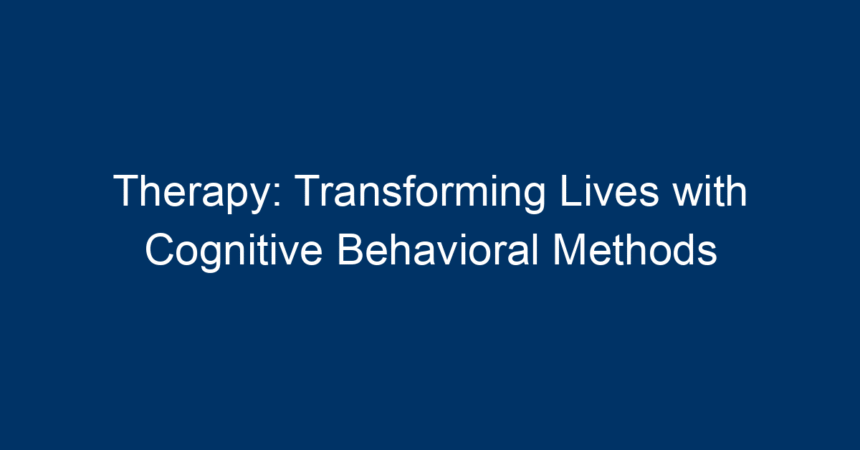Introduction
In a world increasingly aware of mental health, the term therapy resonates more than ever. Among the various modalities available, Cognitive Behavioral Therapy (CBT) has emerged as a powerful and effective method for addressing a myriad of psychological challenges. From anxiety disorders to depression and beyond, CBT offers individuals tools for transformation, enabling them to lead happier, more fulfilling lives. This article will explore the principles of CBT, its effectiveness, and how it is transforming lives day by day.
Understanding Cognitive Behavioral Therapy (CBT)
What is Cognitive Behavioral Therapy?
Cognitive Behavioral Therapy is a structured, time-limited approach that focuses on the interplay between thoughts, feelings, and behaviors. Developed in the 1960s by Dr. Aaron T. Beck, CBT operates on the premise that our thoughts influence our feelings, which in turn affect our actions. By identifying and challenging distorted thinking patterns, individuals can change their emotional responses and behavioral habits.
The Core Principles of CBT
- Awareness of Thoughts: The first step in CBT is recognizing automatic thoughts. These are often negative or irrational beliefs that can distort reality.
- Challenging Distorted Thinking: Once identified, the therapist collaborates with the client to challenge these thoughts, evaluating their validity and considering alternative perspectives.
- Behavioral Activation: Clients are encouraged to engage in activities that alleviate symptoms and foster positive emotions.
- Skill Development: CBT equips individuals with coping strategies to manage stressors, navigate relationships, and tackle future challenges.
The Effectiveness of CBT
Research-Backed Outcomes
Numerous studies underscore the effectiveness of CBT for a variety of psychological issues. According to the American Psychological Association, research shows that CBT can significantly reduce symptoms in those suffering from anxiety, depression, obsessive-compulsive disorder (OCD), and post-traumatic stress disorder (PTSD).
Time-Limited Approach
One of the appealing aspects of CBT is its structured, time-limited format, typically lasting between 12 to 20 sessions. This focus on short-term solutions encourages individuals to take an active role in their recovery, often leading to quicker improvements and fewer sessions than other therapeutic modalities.
Long-Lasting Change
While CBT is often short-term, the skills acquired during therapy can lead to long-term change. Many individuals report a lasting positive impact on their mental health even after therapy has concluded, highlighting the empowering nature of CBT techniques.
How CBT Transforms Lives
Personal Anecdotes
Many who have undergone CBT share transformative experiences. For instance, Sarah, a 32-year-old marketing executive, struggled with intense anxiety before social events. Through CBT, she learned to identify and challenge her automatic thoughts, recognizing that her feelings of inadequacy were based on distorted beliefs. With the help of her therapist, she gradually faced her fears, eventually embracing social engagements without overwhelming anxiety.
A Toolbox for Life
CBT provides clients with a "toolbox" filled with strategies tailored to their needs. Whether it’s mindfulness techniques, cognitive restructuring, or exposure therapy, these tools empower individuals to handle challenges outside of therapy settings. By fostering self-awareness and resilience, CBT equips clients to face life’s adversities head-on.
Building Stronger Relationships
CBT also enhances interpersonal relationships. By improving communication skills and emotional regulation, individuals learn to navigate conflicts more effectively. This transformation often results in healthier relationships with family, friends, and colleagues, contributing to an overall enhanced quality of life.
Integrating CBT into Everyday Life
Daily Practices
Incorporating CBT techniques into daily life can further enhance mental well-being. Here are some actionable insights:
- Mindful Journaling: Keep a journal to track automatic thoughts and emotions. Reflect on them through a CBT lens, challenging any irrational beliefs.
- Behavioral Experiments: Try small behavioral changes, such as initiating a conversation with a stranger or tackling a dreaded task. Use these experiences to gather evidence that contradicts your fears.
- Affirmations: Create positive affirmations based on your identified negative thoughts. Regularly reciting these can help reinforce healthier thinking patterns.
Seeking Professional Help
While self-help strategies are beneficial, seeking professional guidance from a licensed therapist can provide valuable support. Many therapists specialize in CBT and can tailor their approach to meet individual needs. Online platforms have made therapy more accessible, allowing individuals to seek help from the comfort of their homes.
The Future of Therapy with CBT
Innovations in Therapy
As mental health awareness grows, so does the evolution of CBT. Integrative approaches combining CBT with technology, such as mobile apps and online forums, offer new avenues for support. These tools can provide supplementary resources and constant access to coping strategies, further enhancing the therapy experience.
Expanding Reach
Cognitive Behavioral Therapy is expanding its reach beyond traditional settings. Workshops, webinars, and community programs are making therapy more accessible, allowing more people to benefit from its principles. Schools and workplaces are increasingly recognizing the importance of mental health, incorporating CBT techniques into wellness programs.
Conclusion
Therapy, particularly through the lens of Cognitive Behavioral Therapy, serves as a beacon of hope for many facing mental health challenges. By transforming thoughts and behaviors, CBT empowers individuals to take control of their lives. Those who engage with CBT not only address immediate concerns but also cultivate skills that lead to long-lasting personal growth. If you or someone you know is seeking to navigate life’s challenges, consider exploring CBT as a pathway to transformation. The journey may begin with a single session, but the impact can last a lifetime.
Through the exploration of CBT, we recognize its transformative potential. Whether you’re directly seeking therapy or supporting someone else, this knowledge can serve as a springboard for meaningful change, ushering in a brighter, healthier future.




